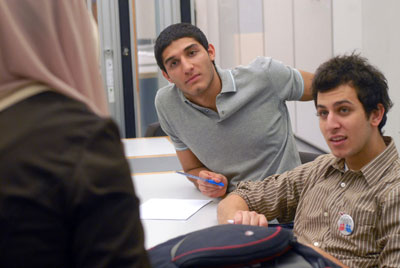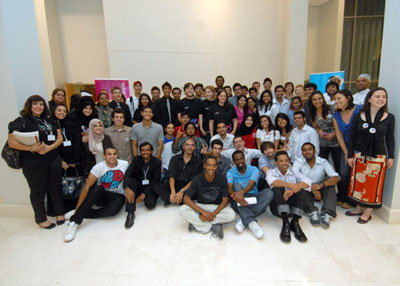WCMC-Q Hosts First Annual Nation University Debate Day
October 2009
Students from seven universities around Doha recently gathered at WCMC-Q for the first annual university debate day. The event exposed newcomers to the ground rules of debating and gave everyone a chance to practice in a non-competitive environment.

WCMC-Q Debate Team members Lina Abdul Karim,
Mohamed Elshazly, and Adam Shurbaji discuss strategy
before the fourth and final round of the debates.
“This experience was really satisfying,” said Hayder Ahmed, a WCMC-Q premed student at WCMC-Q and first-time debater. “I surprised myself—I didn’t know that I could speak like that and I see that I can and I can do it quite well.”
Throughout the day, 16 teams—of students from Northwestern University in Qatar, Qatar University, Georgetown University-Qatar, Stenden University Qatar, Carnegie Melon University-Qatar, College of the North Atlantic-Qatar, and WCMC-Q—participated in four debate rounds. Each round saw eight simultaneous debates around a single topic.
The first round challenged students to argue for or against the notion that a strong dictatorship is better than a weak democracy. The second round was based on the proposition that the UN has failed in its objective. The third round saw debate about a ban on cosmetic surgery, and the final round provoked arguments for and against a life sentence for prisoners and whether or not they should be able to choose an early death.
“As we become doctors, we will be exposed to so many issues, like stem cells, and ethical decisions, that will require us to think about both sides,” said Ayman Al-Jurdi, a WCMC-Q premed student who participated in the debate day.

Students and organizers from all seven of the participating
area universities come together for a group photo.
Among judges was Dr. Basim Uthman, professor of neurology at WCMC-Q. “Debating requires attentive listening, respect for others’ opinions and courage to reason and voice one’s opinion.All are experiences that can boost our students’ confidence, tolerance and social skills and help them become better practicing physicians.” Dr. Uthman said.
In the end, the debates helped students see important issues from more than just one angle.
“All of the students who come to debating for the first time require some sort of coaching in relation to the nature of debate. It could be that they need to have it spelled out that believing in the motion and arguing for or against a motion are two completely different things,” said Rodney Sharkey, PhD, assistant professor of English at WCMC-Q. Sharkey has been working with WCMC-Q’s debate club to get it up and running as a completely student-run organization.
Report by Emily Alp
